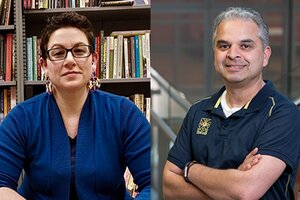Date
11/22/22
Jenny L. Davis of American Indian Studies (left) and Ripan S. Malhi of Anthropology will co-chair the new Center for Indigenous Science
November 21, 2022
The Carl R. Woese Institute for Genomic Biology is excited to announce the new Center for Indigenous Science, which aims to create a place for cutting edge research and training in Indigenous Science. The center will be headed by Jenny L. Davis, co-Chair of the Center and Associate Professor of American Indian Studies, and Ripan S. Malhi (GNDP/GSP/IGOH), co-Chair of the Center and Professor of Anthropology.
Indigenous Science consists of the oldest models of science on the Western hemisphere, yet these models are underrepresented in current academic spheres. Furthermore, benefits derived from predominantly white models of science are not equally distributed throughout society, prompting the need for alternative models that are inclusive and equitable. The new center will provide a welcoming environment where Indigenous peoples can work together with scientists at the IGB and across campus, and promote research that is above all, ethical, sustainable, and community-focused.
“The potential for science to contribute to solving today’s societal and environmental problems is hampered by current views and methods in the scientific community that stem from colonial ideas and values that are extractive and myopic,” said Davis. “Indigenous Science offers alternative models to scientific practices that are collaborative, community-based, inclusive, sustainable and holistic.”
The Carl R. Woese Institute for Genomic Biology is excited to announce the new Center for Indigenous Science, which aims to create a place for cutting edge research and training in Indigenous Science. The center will be headed by Jenny L. Davis, co-Chair of the Center and Associate Professor of American Indian Studies, and Ripan S. Malhi (GNDP/GSP/IGOH), co-Chair of the Center and Professor of Anthropology.
Indigenous Science consists of the oldest models of science on the Western hemisphere, yet these models are underrepresented in current academic spheres. Furthermore, benefits derived from predominantly white models of science are not equally distributed throughout society, prompting the need for alternative models that are inclusive and equitable. The new center will provide a welcoming environment where Indigenous peoples can work together with scientists at the IGB and across campus, and promote research that is above all, ethical, sustainable, and community-focused.
“The potential for science to contribute to solving today’s societal and environmental problems is hampered by current views and methods in the scientific community that stem from colonial ideas and values that are extractive and myopic,” said Davis. “Indigenous Science offers alternative models to scientific practices that are collaborative, community-based, inclusive, sustainable and holistic.”
